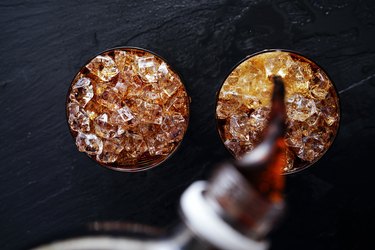
Loaded with sugar and calories and devoid of essential nutrients, soft drinks represent a quintessential "junk" food. Unfortunately, they're also a staple in the average American diet, with roughly more than one-half of the U.S. population drinking at least one soft drink a day, according to the Centers for Disease Control and Prevention.
If you're trying to lose weight, a no-soda diet is a great place to start. But the amount of weight you lose from stopping your soda habit depends on how much you drink.
Video of the Day
Video of the Day
Tip
The amount of weight you lose on a no-soda diet depends on how much soda you're drinking a day to start. If it's one can, you may be able to drop about 15 pounds in a year if all else stays the same.
Calories and Weight Loss
When you diet to lose weight, each day you must consume fewer calories than you burn. That way, your body will tap into your fat stores and use them as a source of energy, which reduces your levels of body fat.
Even if you're drinking only one soft drink a day, eliminating that one drink will save you a significant number of calories. For example, a 12-ounce can of cola has 152 calories. A can of cream soda has 189 calories, and a can of a lemon-lime soda has 103 calories.
If you're drinking an average of 150 calories of soda every day, not drinking soda will save you 1,050 calories per week. Over a year's time, that translates to the equivalent of more than 15 pounds of fat — not including any weight you'd lose from other lifestyle changes such as getting more exercise.
According to a 2011 report from the National Health and Nutrition Examination Survey, about 5 percent of the U.S. population drinks more than 567 calories from soda daily — which is equivalent to approximately four soft drinks. If that percentage includes you, your no-soda diet would save you enough calories to lose almost 60 pounds over a year's time.
Read more: The Top 10 Worst Soft Drinks For Your Health
Don't Drink Diet Soda, Either
Although diet soda has fewer calories than non-diet soda, that fact doesn't necessarily make it better for weight loss. One of your diet goals should be to adjust to the taste of unprocessed foods.
If you're used to the overwhelmingly salty and sweet tastes of processed foods, healthy foods can feel bland in comparison — but as you follow a healthy diet, you'll start to appreciate the subtler flavors of healthy foods. Drinking diet soda means you're still experiencing very sweet flavors — which makes it more difficult to "reset" your palette so that you can enjoy healthy foods.
Artificial sweeteners also disrupt your body's "fullness" signals, and affect your metabolism in a way that triggers weight gain, according to a July 2013 study published in Trends in Endocrinology and Metabolism. Although it's not clear exactly how much weight you'd lose by not drinking diet soda, it should help you on your weight loss journey.
Other Health Benefits You'll Notice
Not drinking sugary beverages such as soda also offers other benefits. You'll reduce your risk of heart attack, Type 2 diabetes and gout, according to the Harvard T.H. Chan School of Public Health. Not drinking soda might also benefit the health of your bones, because people who drink soda are less likely to get enough calcium from their diet, and the phosphate in soda can affect bone health.
Substituting sugary drinks and processed foods for water and a healthful diet might also keep your appetite in check. Sugary drinks digest quickly, which causes your blood sugar to rise soon after drinking them.
Not long afterward, your blood sugar crashes, which increases your hunger levels. Avoiding sugary foods — including soda — can prevent these spikes and crashes, so that you'll have an easier time maintaining your diet.
Limit Juice and Juice Cocktails
Although drinking soda is bad for weight loss — in addition to your overall health — drinking juice isn't much better. Juice does have some essential nutrients, but it's still high in calories, which may interfere with your weight loss.
In some cases, juice can be higher in calories than soda. For example, a 12-ounce serving of unsweetened grape juice sets you back 228 calories, which is significantly more than the 152 calories found in the same size serving of cola. Juice cocktails are also high in calories — a cup of cranberry juice cocktail has 141 calories — and often contain added sugar, making them similar to soft drinks in that regard.
Although juice cocktails may contain real juice, they're not helpful for weight loss or for overall health.
Read more: Is Club Soda Good For You?
Alternatives to Soda
When you're dieting, your best bet is to drink plain water — it's cheap, widely available and calorie free. But if you're craving carbonation, try sparkling water as a treat
Add flavor to sparkling water with a squeeze of lemon juice, a few crushed raspberries or sliced strawberries, or even some spiral-cut cucumber slices for a fancy-looking beverage with a subtle taste. Or use herbs and spices — such as mint, basil, cilantro, cinnamon sticks or sliced, fresh ginger — to make flavored water, minus the sugar.
- Centers for Disease Control and Prevention: "Consumption of Sugar Drinks in the United States, 2005–2008"
- MyFoodData: "Nutrition Comparison of Cream Soda, Sprite, and Cola Soft Drink"
- Harvard T.H. Chan School of Public Health: "Sugary Drinks"
- Trends in Endocrinology and Metabolism: "Artificial Sweeteners Produce the Counterintuitive Effect of Inducing Metabolic Derangements"
- Centers for Disease Control and Prevention: "Get the Facts: Sugar-Sweetened Beverages and Consumption"
- MyFoodData: "Nutrition Comparison of Cranberry Juice Cocktail and Grape Juice"